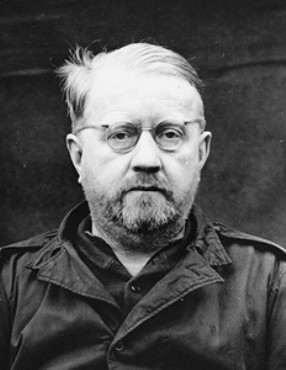Gerhard Rose
Gerhard Rose (November 30, 1896 – January 13, 1992) was a German tropical medicine specialist and a high-ranking officer in the Nazi SS. His work and contributions to medicine were overshadowed by his involvement in human experimentation during World War II.
Early Life and Education[edit | edit source]
Gerhard Rose was born in Stuttgart, Germany. He pursued his medical studies at several German universities, including Tübingen, Munich, and Hamburg, where he specialized in tropical diseases. After completing his education, Rose worked in various countries, including Russia and Indonesia, to gain practical experience in the field of tropical medicine.
Career[edit | edit source]
Upon returning to Germany, Rose became a leading figure in the field of tropical medicine. He was appointed as the director of the Robert Koch Institute's Department of Tropical Medicine. In this role, he conducted significant research on malaria, typhus, and other diseases prevalent in tropical regions.
During the Nazi regime, Rose joined the SS and rose to the rank of Gruppenführer, equivalent to a major general. He was involved in the Nazi human experiments conducted on concentration camp prisoners, particularly in the development and testing of vaccines against typhus. These experiments, carried out primarily in the Buchenwald concentration camp, resulted in the death and suffering of many inmates.
Post-War Trials and Conviction[edit | edit source]
After the war, Gerhard Rose was arrested and tried in the Doctors' Trial, part of the subsequent Nuremberg Trials. He was accused of war crimes and crimes against humanity for his role in the typhus vaccine experiments. In 1947, Rose was convicted and sentenced to life imprisonment. However, his sentence was later commuted, and he was released in 1955.
Later Life[edit | edit source]
Following his release, Rose attempted to reintegrate into the medical community but faced significant opposition due to his Nazi past. Despite this, he continued to contribute to the field of tropical medicine through writing and research until his death in 1992.
Legacy[edit | edit source]
Gerhard Rose's legacy is a complex one. On one hand, he made significant contributions to tropical medicine. On the other, his involvement in unethical human experiments during the Nazi era has overshadowed his scientific achievements. The moral and ethical implications of his work continue to be a subject of discussion among historians and ethicists.
Search WikiMD
Ad.Tired of being Overweight? Try W8MD's NYC physician weight loss.
Semaglutide (Ozempic / Wegovy and Tirzepatide (Mounjaro / Zepbound) available. Call 718 946 5500.
Advertise on WikiMD
|
WikiMD's Wellness Encyclopedia |
| Let Food Be Thy Medicine Medicine Thy Food - Hippocrates |
Translate this page: - East Asian
中文,
日本,
한국어,
South Asian
हिन्दी,
தமிழ்,
తెలుగు,
Urdu,
ಕನ್ನಡ,
Southeast Asian
Indonesian,
Vietnamese,
Thai,
မြန်မာဘာသာ,
বাংলা
European
español,
Deutsch,
français,
Greek,
português do Brasil,
polski,
română,
русский,
Nederlands,
norsk,
svenska,
suomi,
Italian
Middle Eastern & African
عربى,
Turkish,
Persian,
Hebrew,
Afrikaans,
isiZulu,
Kiswahili,
Other
Bulgarian,
Hungarian,
Czech,
Swedish,
മലയാളം,
मराठी,
ਪੰਜਾਬੀ,
ગુજરાતી,
Portuguese,
Ukrainian
Medical Disclaimer: WikiMD is not a substitute for professional medical advice. The information on WikiMD is provided as an information resource only, may be incorrect, outdated or misleading, and is not to be used or relied on for any diagnostic or treatment purposes. Please consult your health care provider before making any healthcare decisions or for guidance about a specific medical condition. WikiMD expressly disclaims responsibility, and shall have no liability, for any damages, loss, injury, or liability whatsoever suffered as a result of your reliance on the information contained in this site. By visiting this site you agree to the foregoing terms and conditions, which may from time to time be changed or supplemented by WikiMD. If you do not agree to the foregoing terms and conditions, you should not enter or use this site. See full disclaimer.
Credits:Most images are courtesy of Wikimedia commons, and templates, categories Wikipedia, licensed under CC BY SA or similar.
Contributors: Prab R. Tumpati, MD



